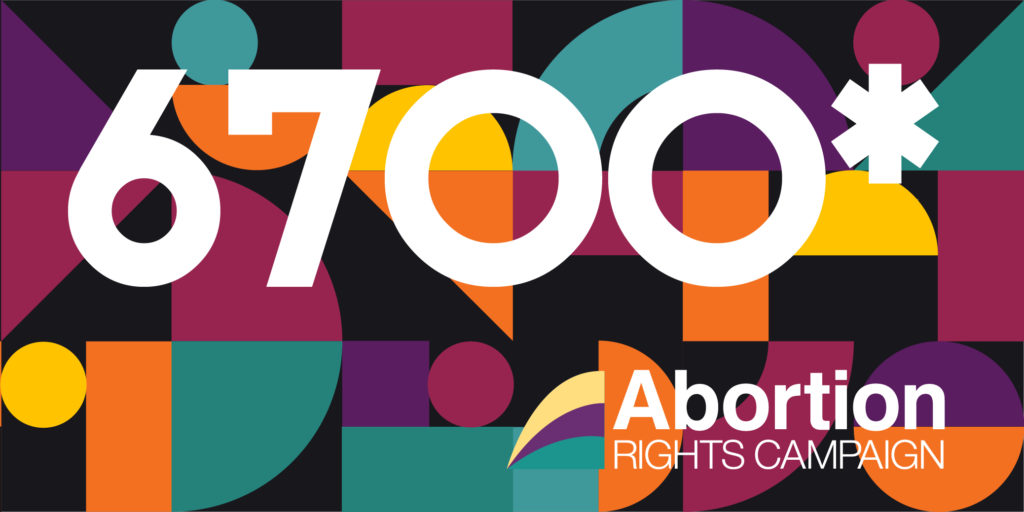
The Abortion Rights Campaign welcomes the news that at least 6,700 people were able to access safe and legal abortion within Ireland last year. Abortion is an essential part of sexual and reproductive health for hundreds of thousands of women, girls, trans men and non-binary people who can become pregnant in this country.
Commenting on the figures, ARC spokesperson Helen Stonehouse said: “The amount of abortions carried out in Ireland last year underscores the consistent demand for quality, accessible abortion care in every county. Overall, the number of abortions is broadly similar to 2019 and 2020, and once again, people from every county in Ireland accessed abortion services. The gaps in data collection mean that direct comparison of grounds-based access is not possible. It is deeply frustrating that the Department of Health has managed to investigate the discrepancies between funding claims and notification statistics, but we still do not know why so many maternity hospitals and GPs refuse to provide abortion care.”
The UnPAC report recently released by Dr Conlon shows that timely access to abortion remains a significant issue, particularly in rural areas. We know that the mandatory 3-day waiting period negatively affects people, adding emotional trauma and removing their sense of autonomy. The UnPAC report also highlights the inadequacies in abortion provision after the 12-week limit, with one participant stating:
“[A]s soon as we weren’t in the category that was eligible under current Irish legislation everyone was silenced because they didn’t know how much to say or not say. Which is bizarre because there’s freedom of travel and you know it’s not, we weren’t looking to have a conversation about whether or not we should terminate our child, we were looking to have a conversation about [what] outcomes for foetuses like our child is. … as soon as we weren’t in a clear diagnostic category that was fatal, everyone clammed up. … I could see the shame and witness it and go “why am I internalising this because it’s not how I feel I should be judged or want to judge myself.” But there’s something just very shameful about not being able to have these conversations with your care providers and not being able to access care in your own country.”
Ms Stonehouse continued, “This is one of many examples of enduring stigma and shame around abortion access that significantly negatively impacts care provision. These findings are supported by our own research into barriers to abortion provision in Ireland. Abortion must be available on request throughout pregnancy, without shame or stigma.”
“It is also important to note that the HSE data released today only includes the provision of abortion overseen by clinicians. It does not account for the growing trend towards self-managed abortion through the use of abortion pills obtained online, nor does it include those who have been refused abortion care in Ireland. Again from the UnPAC report, we know that at least 225 people have imported abortion pills from Women on Web. The reasons cited for importing pills included abusive relationships, lack of accessible provision, and undocumented migrant status (a PPSN is required to access abortion without cost). This indicates that legislative barriers most significantly impact marginalised groups, leaving them without adequate healthcare. More and better abortion provision is needed at regional and local levels to respond to current and future demand for abortion.”
Ms Stonehouse concluded, “The report does not capture how many people had to travel long distances within Ireland because there were no abortion providers in their area, and how much distress was caused by the barriers within our legislation. The review must rectify the failings of our legislation so that abortion is available on request throughout pregnancy for everyone who needs it. Anything less means far too many people left behind.”
ENDS
Notes to Editor
- The Department of Health Annual Report on numbers accessing abortion under the Health (Regulation of Termination of Pregnancy) Act 2018 is available here: https://www.gov.ie/en/publication/ce61b-notifications-in-accordance-with-section-20-of-the-health-regulation-of-termination-of-pregnancy-act-2018-annual-report-2021/.
It includes an explanatory note regarding the discrepancies in statistics.
- The UK Department of Health statistics is published here: https://www.gov.uk/government/statistics/abortion-statistics-for-england-and-wales-2021.
The county-by-county breakdown for Ireland is in 12d of the Abortion statistics 2021: data tables.
- The Unplanned Pregnancy and Abortion Care (UnPAC) study is available here: https://www.sexualwellbeing.ie/for-professionals/research/research-reports/unpac.pdf.
- The Abortion Rights Campaign submission for the review of the operation of the Health (Regulation of Termination of Pregnancy) Act 2018 is available at: https://www.abortionrightscampaign.ie/wp-content/uploads/2022/03/ARC_Submission.pdf.
- The Too Many Barriers: Experiences of Abortion in Ireland after Repeal report is available at: https://www.abortionrightscampaign.ie/research
- The 11th annual March for Choice is happening on Saturday, September 24th 2022, with the theme of Abortion on Demand, Without Apology.

